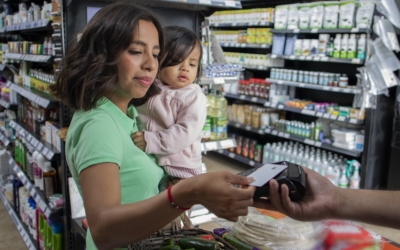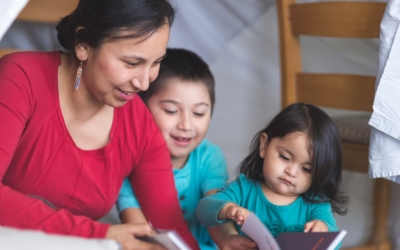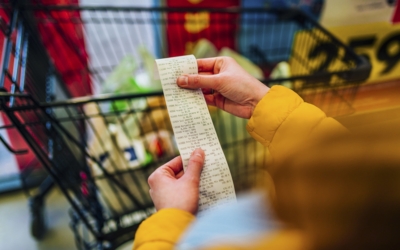I Can for Kids (iCAN) is frequently asked what we mean by “dignity” when we discuss the advantages of our grocery gift card model. In our opinion, the charitable sector isn’t qualified to answer this crucial question. Instead, the answer lies within conversations and research that empower food-insecure populations to voice their own definitions of a dignified life. In this blog, we share valuable insights about dignity from current evidence and from the families who benefit from our program.
How does dignity relate to food?
In Canada, households become food insecure when they lack the finances to cover all their basic needs. Experts recommend we establish income-based solutions that circumvent the indignity of food-based assistance and truly address a lack of money as the root cause of food insecurity. Yet for decades, the near singular response to this rapidly growing health issue has been the proliferation of an inefficient and disjointed food charity sector.
Extensive research in high-income countries reveals overlapping themes that explain why food-insecure households experience a loss of dignity and self-esteem when participating in food programs. Across dozens of studies, women living on low incomes, people experiencing homelessness, and food charity recipients highlight the following reasons that traditional food programming leads to feelings of shame, judgement, or disconnection:
- alienation from society when forced to access venues outside the regular food system
- humiliation when expected to disclose personal details about their financial struggles
- powerlessness over the quality and the types of food they receive
- inability to access healthy and fresh food in a safe and social environment
- inconsistent and unpredictable hours of operation and eligibility requirements
- outside expectations to be grateful for imposed food options that guarantee their physical survival regardless of the impact on their health and well-being
How can we optimize dignity?
Although some food programs offer large volumes of food at low or no cost, they can never overcome the uncertainty, anxiety, and mistrust that food-insecure families endure when they have no power to choose everything that they truly need. During our own research, we interviewed multiple recipients and agency partners to better understand their experiences with our new grocery gift card model. The strongest theme in our published study emphasizes how the dignity of our income-based approach empowers families with:
- predictable access to all the foods they need
- freedom to choose the foods that meet their unique needs
- flexibility and convenience to shop at a time and location of their choice
- improved social connection within their communities
- reduced mental and financial stress
- enhanced confidence to provide for their children
- no stigma due to the discreet nature of our program and grocery gift cards
Similarly, during a recent case study in the United States, researchers interviewed more than 60 food-insecure households to ask them to define a more dignified response to their struggles. They expressed an overwhelming need for solutions that empower them to:
- choose foods that align with their cultural or religious identity
- participate in important food traditions and celebrations
- create stronger family and social bonds through preparing and sharing meals
- be an effective provider for their household
- strengthen their ability to remain self-sufficient, healthy, and resilient
In Ontario, researchers interviewed numerous food-insecure adults to gather recommendations on how to design more progressive alternatives to charitable food programs. Nearly all study participants voiced a strong preference for a system that empowers them to choose their own food at a grocery store with dignity and much less stress. They felt that the growth and spread of food programs simply perpetuates the number of people who remain food insecure.
How does dignity add value?
When we hear from parents who access our program, they repeatedly mention other benefits beyond buying their children food that they enjoy. Grocery gift cards empower families with the same freedom, confidence, and respect that we all need to maintain a strong sense of self-worth and self-reliance. They also value our commitment to empower them with equal dignity to achieve and sustain the right to food. A young father who can no longer work due to a neurological condition recently inspired us with his views on respect:
“Thank you for choosing to build people up. It’s clear that you value their wellness – and that’s both rare and beautiful. Most people are so busy that they don’t see what’s actually happening. And then there’s people like you who see beyond the veil. You understand because you haven’t taken your eyes off your mission. Thank you for being in-distractable. Thank you over and over for pouring your care into my family.”
When you donate today, you restore a fundamental sense of humanity for food-insecure children and families in Calgary who can now choose the healthy foods they need and enjoy.
To join iCAN’s expanding list of donors, sponsors, and champions, check out the different ways you can get involved or donate.
To learn more about I Can for Kids and their unique approach to childhood food insecurity, visit www.icanforkids.ca
About Donald Barker
Donald Barker has worked as a registered dietitian for more than 25 years. He also has a professional background in communications and has long advocated for populations who face adverse, unjust, or systemic barriers that lead to higher rates of poor social, mental, emotional, and physical health outcomes. Donald currently volunteers as an Advisor with iCAN to support our transition towards evidence-based approaches that help improve the well-being of children in Calgary who live in low-income and food-insecure households.
About I Can for Kids Foundation
I Can for Kids works closely with multiple agency partners to target and distribute grocery gift cards to food-insecure families who are most in need. The iCAN grocery gift card program is a more dignified and inclusive approach to dealing with food insecurity, allowing families to shop where everyone else shops and to choose foods that are appropriate for their health and cultural needs. Explore their website to discover more about iCAN’s impact over the years.
For more information and media inquiries, please contact iCAN Executive Director, Bobbi Turko at bobbi@icanforkids.ca.




